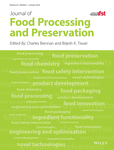Synergistic antifungal effects of thyme essential oil and Lactobacillus plantarum cell-free supernatant against Penicillium spp. and in situ effects
Funding information: Ministry of Agriculture and Cooperatives
Abstract
This study evaluates the synergistic antifungal effects between thyme essential oils and Lactobacillus plantarum cell-free supernatant (LCFS) against Penicillium spp. and in situ antifungal activity in rice grains. Thyme essential oil and LCFS showed remarkable antifungal activities against Penicillium spp. with the minimum inhibitory concentration (MIC) of 40 and 80 µL/mL, respectively. The analysis of fractional inhibitory concentration (FIC) index showed the antifungal synergism between thyme essential oil and LCFS against Penicillium spp. with FIC index of 0.5. This synergism also resulted in fourfold reduction in their MICs when applied in combination. The antifungal modes of action were characterized by observing the changes in cell membrane permeability and degradation of fungal cell wall. The combination of thyme essential oil and LCFS (2 × MIC of each) showed remarkable in situ antifungal effect and completely inhibit the growth of Penicillium in rice seeds. The results suggested the possible applications of the observed synergism on actual crops.
Practical applications
Essential oils are used as preservative in food industry and high concentration of essential oil is associated with negative organoleptic characteristics. This study presented a novel approach for synergistic antifungal effects by using the combination of thyme essential oil and Lactobacillus plantarum cell-free supernatant (LCFS) against Penicillium spp. and systematic evaluation of the antifungal effect by using fractional inhibitory concentration (FIC) index method. This approach will be a role model for future research on synergism and overcome the major drawbacks of using live bacteria and the negative effects arising from antimicrobial activities of essential oils.




